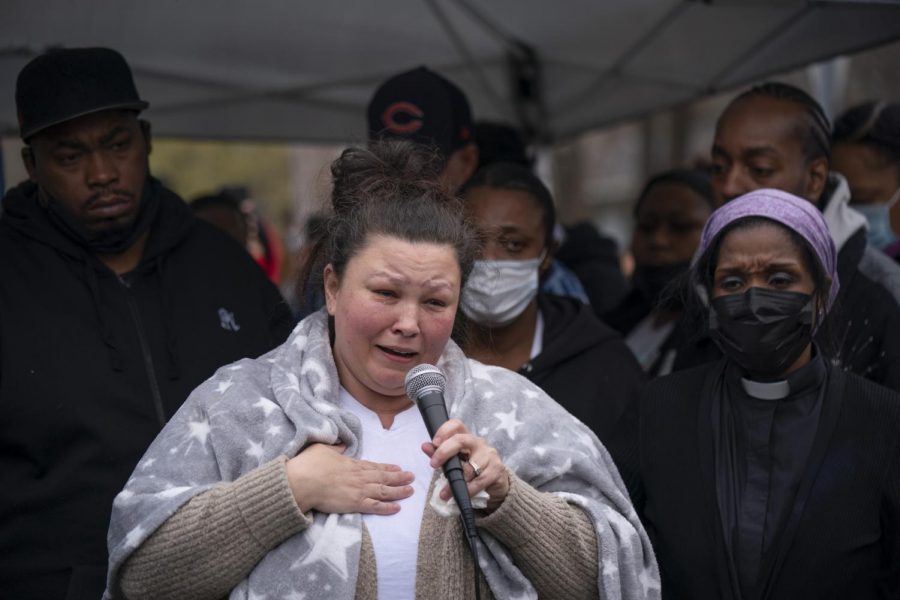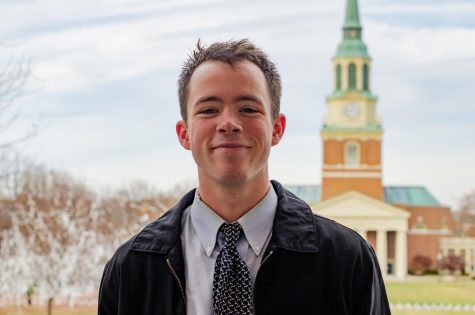Conversation prompts change for America’s gun problem
Legislative opportunities for gun control remain abundant despite broken congressional system
Katie Wright speaks at the vigil for her son, Daunte Wright. Daunte Wright was fatally shot at a traffic stop by a Minnesota police officer, Kim Potter, on April 11.
April 15, 2021
Connor McNeely: Well, Joe, even though it might be wise to present the subject of our discussion to the reader, I don’t really think anyone needs an introduction. The majority of the American public knows about our country’s dark history of mass shootings. The question is: will we ever be able to stop them?
Joe Cho: I agree, Connor. History has shown time and time again that shootings are indeed part of our culture and need no introduction. As for that heavy question, I believe there are two components to the answer: shootings themselves will never stop, but there is an endearing hope that we, the human race, can try to lessen these tragedies. Change must come from a collective acknowledgment that reform must take place in order for shootings to subside, and that can come only from the effective fulfillment of individual moral obligations.
Think about it like this. If one day, God forbid, your loved one was a victim of such a violent, heinous act, you would go to great lengths to seek justice in honor of them. If people constantly thought along these lines, ideally, there would be countless burning feet for a fervent gun-control movement. But this is no ideal world. Change doesn’t come easily, especially in the United States — right, Connor?
CM: Definitely not. In my humble opinion, one of the things that this nation has overlooked is the purity and efficiency of its lawmaking system. Feel free to fight back on this one, but to me, it seems that Congress is made up of people who are bought and paid for by corporations and political organizations. No one is able to be truly bipartisan because their opinions and reasoning are manufactured. The NRA gave out $9.55 million during last year’s midterm cycle — although this is down from their $54.40 million total in the 2016 election cycle (OpenSecrets.org/Center for Responsive Politics). Candidates have an obligation to grant the wishes of their supporters and in most cases, their supporters are comprised largely of the upper class of the United States.
JC: This is certainly true. Constituency in the United States complicates many of the major domestic issues that require reforms like the controversial topic of gun control. This often leads to gridlock on congressional floors and, in turn, we can’t seem to move forward with urgency and poise to combat the combative. In my honest opinion, it seems that one side is quick to jump to resolution without a proper, detailed course of action, while the other side is concentrated on the economics of a resolution, which conveys their lack of empathy for the situation.
CM: I’m not quite sure I’m there with you on “complicates,” because I think the constituency problem completely negates any capacity for real, legislative change for the people. But to your second point, empathy, without a doubt, is a huge topic that needs to be addressed.
JC: Of course. Shootings have a deluge of consequences, such as the individual tragedies of Trayvon Martin, Ahmaud Arbery, Breonna Taylor and many others (especially during the heat of BLM). Recently there was the “accidental” shooting of Daunte Wright. Remember the 17-year-old Kyle Rittenhouse of Kenosha who shot up pedestrians back in 2020? Remember Columbine or Las Vegas? Maybe the Orlando, Fla. nightclub? There was the Sandy Hook Elementary School shooting, the Sutherland Church shooting, the El Paso shooting, the Texas Walmart shooting, the Parkland High School shooting, the Pittsburgh Synagogue shooting, the San Bernardino attack — the list goes on and on.
We’ve lived through most, if not all, of these incidents and it’s shocking how desensitized we’ve become. Within this universal desensitization lies a darker truth. The CDC reported that suicides accounted for six out of 10 deaths by firearms in the United States in 2018. This means that more people die from a silent bullet than the mass homicides that are audaciously advertised over media platforms.
CM: If you were to peek behind the curtains of social media and private messaging, you would find a lot of immature and insensitive jokes. I hate to be cliché, but change starts at the individual level. It’s incredibly easy to joke about these tragedies, because they seem as if they could never truly happen to us, personally. People see and hear of others dying on the news and through social media, but what are they supposed to do about it?
Well, everyone in America has learned how tremendously important voting is from this most recent election cycle — so why not take that further? I would advise people to look for candidates at the local and state level who don’t take PAC money, who truly dedicate their time to the people they serve. Look past virtue signaling. Democratic Party representatives Elaine Luria and Seth Moulton are good examples of candidates who have made these kinds of disingenuous pledges.
JC: I would have to aggressively emphasize that these social media remarks were not just immature and insensitive, but incredibly hateful and unacceptable. Even after the most recent shootings in Atlanta, where a gunman massacred 10 people, eight of whom were of Asian descent, there was still a surge of hate crime-related messages that targeted Asian-Americans. And to expand upon your latter statement on voting efficacy, President Biden has proposed monumental changes on gun control, such as “banning assault weapons, closing background check loopholes and stripping gun manufacturers of their immunity from liability lawsuits (New York Times), and this was made possible through the contentious 2020 election.
CM: Joe, this type of article is a great opportunity to inspire others to have similar conversations about gun control. We have tried to dedicate this space to well-reasoned, evidenced arguments. Thanks for having this conversation with me.
JC: Agreed. Hard conversations with the ones around us often end up making the most difference. Thank you, Connor.
























